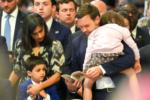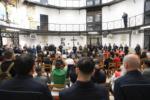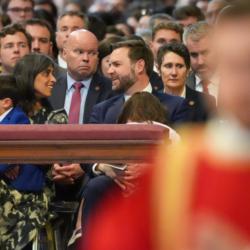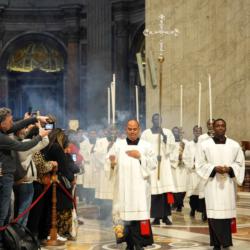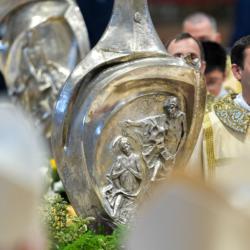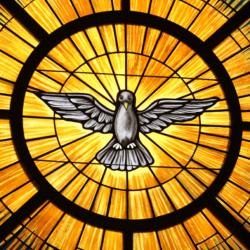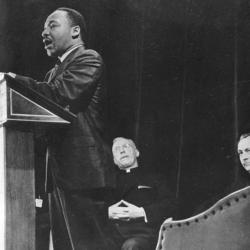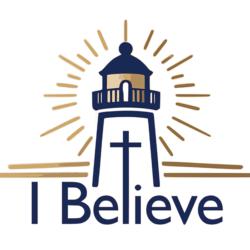Newton collaborative prepares to welcome refugee family
BRAINTREE -- For parishioners of the Sacred Heart and Our Lady Help of Christians Collaborative in Newton, helping solve the refugee crisis isn't something for people in a far off land, but something that will soon be literally at their doorstep.
The collaborative will be welcoming a refugee family of five from Sudan into the country on Aug. 22, and parishioners couldn't be more excited.
"The amount of energy I have seen people put out for this has been outstanding," said Jim Allaire, coordinator of parish's efforts to welcome and assist the family as it transitions to life in the United States.
"It's been a wonderful experience for our collaborative to have this concrete work of mercy that we can commit to," he said.
The collaborative is part of the program POWR, or Parishes/People Organized to Welcome Refugees. It's a program funded by the U.S. Conference of Catholic Bishops, and implemented by individual dioceses or charitable organizations throughout the country. While the USCCB gives guidelines and ideas on how the POWR program can be run, ultimately it's up to the local communities to decide precisely how to design and carry out the program.
In the Archdiocese of Boston, the program is carried out by Catholic Charities of the Archdiocese of Boston.
Speaking to The Pilot Aug. 1, Director of Catholic Charities' Refugee and Immigration Services Marjean Perhot said the organization is focusing on parish sponsorship of refugee families with the program.
In the archdiocese, Catholic Charities has settled around 230 refugees from around the world each year, working to provide newly arrived families with a place to live and basic necessities, as well as job placement services, English language training, and assistance with acculturation.
With POWR, "we thought that by partnering with a parish we would more than double the resources and the capacity to do things such as find housing and provide a very deep level of care to the newcomers by using parish volunteers," said Perhot.
The POWR program is fairly new to Catholic Charities of the Archdiocese of Boston, but it already has eight parishes or collaborative participating. Only one collaborative, New Roads Catholic Community in Belmont, has welcomed in a family so far -- an Iraqi family of four. The Newton collaborative will be welcoming in a family later this month, and the other six parishes are still in the planning stages.
For the parishes, it's not a quick process, Perhot explained. First, before a family is even assigned, interested parishioners must go through 10 to 15 hours of training. The training is given by Catholic Charities' coordinator of the program, Grace Gaskill, and includes a presentation and readings from a handbook.
After a family has been assigned, the parish will then continue to work with Gaskill for ongoing training needs, as well as a case manager for the refugee family.
Very little is known about a refugee family before they arrive other than basic information, said Perhot, so Catholic Charities' remains a constant resource and area of support to participating parishes.
If a family has cultural traditions unfamiliar with members of the parish, for example, Perhot said, "we can come in and do a cultural background on that or provide (the parish) with resources on how to handle certain situations."
Catholic Charities had originally planned to implement the POWR program in as many as 30 parishes in the archdiocese, but following the Trump Administration's moves to limit refugee resettlement in the U.S., that number has been paired down to a "more realistic" 10.
"I think there are many more parishes that want to do this... but we want to be very careful," said Perhot.
"What we don't want to do is set up false hope" for a parish, she added.
For Perhot, reducing the number of parishes in the program from 30 down to 10 is "just one more example of how these executive orders impact wide swaths of people."
"I mean, you have a parish that has been praying for a refugee family and hoping and hoping they'll come, and then all of a sudden the rug is pulled out from both of their feet -- it's very destabilizing and very demoralizing," she said.
The Newton collaborative was among the parishes affected by the administration's refugee policy, said Jim Allaire. The collaborative was originally meant to take in a family from Somalia, but couldn't due to the "changes in federal policy."
Parishioners were doubtful they would get the chance to assist another family "anytime soon," but only weeks later were assigned the family from Sudan.
While the information the collaborative has on the family is limited, Allaire knows it is a family of five consisting of a mother and a father and their three sons, ages 1, 5, and 13. The father speaks and writes English, and the oldest son "somewhat does." The family has relatives in Boston.
Right now, the collaborative is focusing on finding an affordable apartment for the family in the area. As the family will only be able to afford $1,600 or $1,700 a month at first, it hasn't been easy to find place, but parishioners are hopeful something will turn up.
In the meantime, they have a "huge amount of furniture" waiting for the family, and are working to raise up to $16,000 to get the family stabilized.
For Perhot, seeing the love and care the collaborative has dedicated to the family is "amazing."
"It's been a very, very long time since I've seen that, and it really renews my spirit when I see how dedicated and how loving people are towards refugees," she said.
"They have so much to give to the families and then, likewise, the families have a lot to give to the parish," she continued.
To contact the Sacred Heart and Our Lady Help of Christians Collaborative with housing tips for the refugee family or to donate, go to www.sholnewton.org/refugees.



